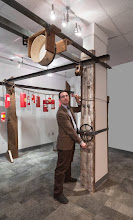"Happiness lies not in the mere possession of money; it lies in the joy of achievement, in the thrill of creative effort. The joy and moral stimulation of work must no longer be forgotten in the mad chase of evanescent profits. These dark days will be worth all they have cost us if they teach us that out true destiny is not to be ministered unto, but to minister to ourselves and our fellow men."
Saturday, March 20, 2010
Tuesday, March 9, 2010
time passes
Dear RCers and ARCers,
Time brings changes in names and in directors. This
will be my last letter as such, and it is difficult to know
what to say. Keats closed his truly last letter with “I
always make an awkward bow,” but then he was John
Keats, dying at 25 with some magnificent poetry to keep
him alive forever. I seldom bow and have not curtsied
since I was in piano recitals as a child. But it is hard to
say good-bye with any grace.
You and this program have been a large part of my
and Murray’s lives, more perhaps than you can imagine.
The names of students and even faculty who were and
are friends often elude us, but the actual people are
always firmly imbedded in memory. Still, I am glad we are
all wearing nametags at the reunion. It has been a good
ride, and you have taught me more than I have you,
although I do hope that some of my favorite books and
films stay with you and are passed on to your children. I
have heard more than once that Grail Literature has
messed up someone’s ability to just see a movie or read a
book without always finding patterns. Sorry. But
sometimes some patterns are helpful. Some of them even
give us the faith and courage to endure.
I am now often reading with Virginia the books that
were once mine and then Emily’s. It is good to believe
that some experiences with literature are able to link
generations. Some of you earliest RCers may already
know this, and I really must leave before grandchildren
begin to apply. I do look forward to hearing from you,
seeing you sometimes at Valle Crucis or reunions.
In the last years I am starting to believe that nothing
ever really ends, it just changes form. Ashby Residential
College will change forms; it must to survive. But the
same truth and spirit that Warren, Dick, Murray, and I
have found so important will remain.
My love (when I bow or curtsy I fall down),
Fran
I hope that I have this kind of effect on my own students, this kind of deep effect that gets under the skin and stays there. The kind that manifests without thought. The process of inquiry that makes it possible to find joy in the support beam of an old mill, or in watching a leaf slowly change color in autumn in the way that makes the memory of an old poem resurface.
Teaching in the moment is hard. Teaching from a twenty year remove is genius.

